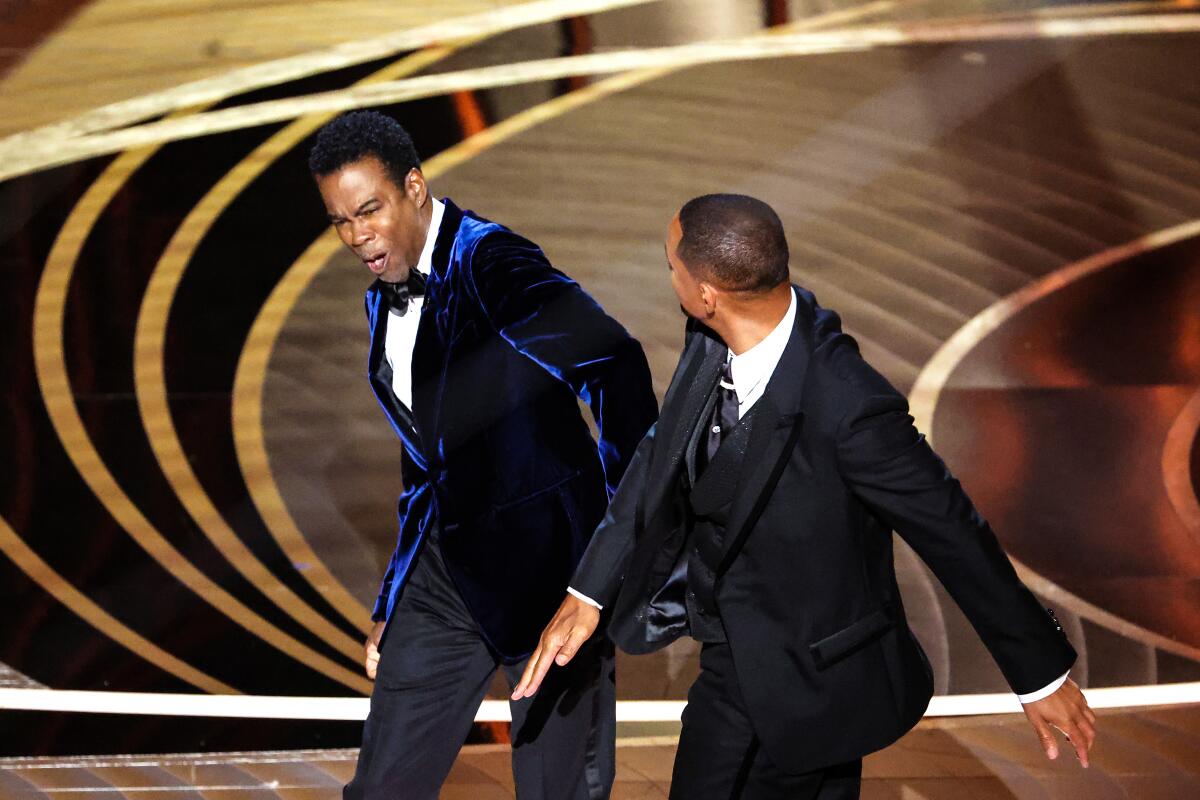Everybody has an opinion on Will Smith. Why the slap resonated

- Share via
Good morning. I’m Kerry Cavanaugh, assistant editorial page editor, filling in for Paul Thornton, who is on a well-deserved vacation. It is Saturday, April 2, 2022. Let’s look back at the week in Opinion.
Well, nobody is calling this year’s Academy Awards show a snoozer. In the seconds after Will Smith stormed the stage and slapped comedian Chris Rock in the face for making a joke about the actor’s wife, Jada Pinkett Smith, there was a moment of uncomfortable confusion. Was it a real blow? Or Oscar-broadcast theatrics? Then it became clear that this was no spoof.
Those few seconds of airtime spurred a week’s worth of commentary that ran far beyond what happened in the Dolby Theatre on Sunday. To Shaun Harper, a professor and executive director of the USC Race and Equity Center, it was an example of toxic masculinity that “compels a guy to go immediately into bar fight mode when someone says or does something disrespectful to someone he loves” and ends up “inflicting harm on ourselves and others.” Columnist LZ Granderson turned his gaze on the recipient of the slap, saying he was “more shocked that Rock decided to mock a Black woman’s hair on the world stage.” Pinkett Smith suffers from alopecia, or hair loss, and sported a closely shorn style. “The slap is what monopolizes our attention, but that wasn’t the only form of violence that transpired in that scene,” Granderson wrote.
The Times editorial board took aim the Academy of Motion Picture Arts and Sciences for its weak-kneed response. “If the assault had been done by a player during an NBA or NFL game, he might have been suspended or fined for fighting. Instead Smith was allowed to walk back to his seat,” and when he won the Oscar for lead actor later in the show, he received a standing ovation. “All of us should be offended by the assault at the Oscars, and the academy should make it clear it will not go unpunished.”
So why did the slap resonate with so many viewers and opinionators? It was, of course, shocking to watch one of the rarified, tuxedoed hyper-controlled Hollywood elite go off on stage and on camera. But the moment hit a lot of other nerves, including the casual violence that we too often tolerate, the fact that women are never safe from judgment of their appearance, the evolving expectations of men as protectors, and the ways that race, class, power and prestige can contort how we see such events. The Oscars certainly weren’t dull this year, but we could all use a little less drama next time.
With hardly any grass or trees, L.A.’s asphalt-covered schoolyards are an environmental injustice. Editorial writer Tony Barboza was already reporting on the dismal absence of vegetation and shade at Los Angeles schools when L.A. Unified’s new superintendent, Alberto Carvalho, started touring campuses and quickly identified the lack of green space as a problem he wanted to fix. Many of the barren schools are in low-income communities of color that suffer from a lack of tree canopy, park space and higher exposure to heat and pollution. “So when do the kids ever get to see something other than the concrete jungle that surrounds them?” Carvalho said. “I think it is our moral responsibility to provide that.” L.A. Times
Sorry, rooftop solar supporters, California incentives really do punish the poor. UC Berkeley professor and faculty director of the Energy Institute, Severin Borenstein, analyzed the state’s rooftop solar incentives and found the program to be “a regressive cost shift” that benefits certain households (disproportionately wealthy and white) that can afford to install solar panels. L.A. Times letter writers, however, argued his analysis missed the bigger picture on rooftop solar.
It’s journalistic malpractice that CBS News made a former Trump staffer a paid contributor. Political advisor and contributing writer Kurt Bardella argues that the White House record of Mick Mulvaney, Trump’s acting chief of staff, should disqualify him from working as commenters or analysts. “Exposing the American people to such pathological liars and despots is an act of journalistic malpractice. What allowed Trumpism to rise in the first place was the media’s misguided notion that ‘both sides’ deserve equal airing and footing even when one side is flagrantly violating the law and lying.” L.A. Times
Enjoying this newsletter? Consider subscribing to the Los Angeles Times
Your support helps us deliver the news that matters most. Become a subscriber.
We still don’t know the extent of financial aid fraud at California’s community colleges, and that’s a problem. Fraudsters, often using bots, filed thousands of fake student applications to California’s community colleges early during the pandemic, and many of them requested financial aid. The problem was discovered, but The Times editorial board warns that many of the schools haven’t been filing reports on their findings on fake applications. “The public also deserves to know the extent of the problem and how much money the schools may have lost by paying the federal government back for fraudulently obtained student aid.” L.A. Times
Republicans hope the justices will keep rolling back rights after striking down Roe vs. Wade. Conservatives are playing a long game that doesn’t stop with curbing abortion rights, writes columnist Jackie Calmes. “Republicans are now openly questioning other familiar court precedents on reproductive, racial and LGBTQ rights that go to Americans’ most intimate decisions about whom they marry and whether they have children.” L.A. Times
Stay in touch.
If you’ve made it this far, you’re the kind of reader who’d benefit from subscribing to our other newsletters and to the Times.
As always, you can share your feedback by emailing me at paul.thornton@latimes.com.
A cure for the common opinion
Get thought-provoking perspectives with our weekly newsletter.
You may occasionally receive promotional content from the Los Angeles Times.







